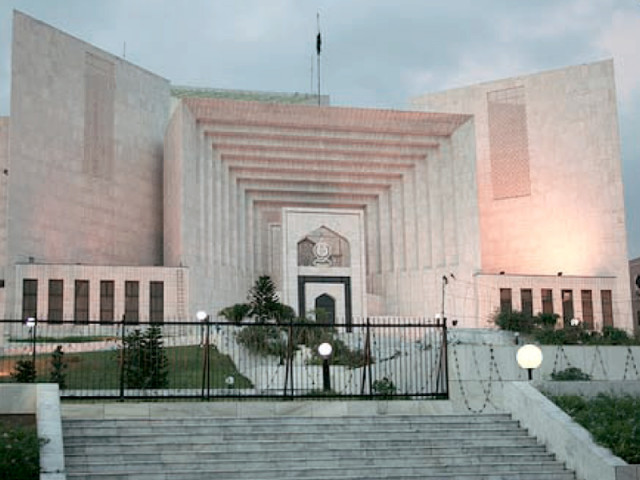Karachi violence case: SC to grill govt about legislation to make the city safer
MQM’s plea against the delimitation of constituencies might also come up.

The case is based on a suo motu notice taken by Chief Justice Iftikhar Muhammad Chaudhry in August 2011 as the city went through a violent summer. PHOTO: FILE
Government officials, the police and Rangers will get a fourth chance to redeem themselves and show the progress they have made in implementing the apex court’s recommendations on how to stem violence plaguing the city.
The five-member bench, headed by Justice Anwar Zaheer Jamali, will comprise Justice Khilji Arif Hussain, Justice Sarmad Jalal Osmany, Justice Gulzar Ahmed and Justice Muhammad Ather Saeed.
The case is based on a suo motu notice taken by Chief Justice Iftikhar Muhammad Chaudhry in August 2011 as the city went through one of the bloodiest summers it has ever witnessed.
In the detailed judgment announced on October 6, 2011, in Islamabad, the apex court ordered several recommendations that the federal, provincial and local governments as well as law enforcement agencies had to implement in one year.
Recap
On October 23 last year, the Supreme Court took the case up again to evaluate how far its orders have been implemented. Since then, three rounds of follow-up proceedings have been conducted in which the judges had ordered the government and law enforcers to deal with the influx of militants into Karachi, re-draw the electoral constituencies and arrest target killers.
Concluding the three-day proceedings of the last session, the judges had ordered the police chief to reveal the political affiliations of as many 23,000 arrested suspects, explain departmental action against 400 policemen facing criminal trials and why 89,000 absconders and proclaimed offenders were still at large in the presence of 100,000-strong police force.
On the agenda
As the bench resumes today, notices have already been issued to the Sindh’s advocate general and prosecutor general, officials of the Election Commission Pakistan, the National Database and Registration Authority, National Aliens Registration Authority, Sindh’s home secretary, chief secretary and the inspector general of police.
Officials from the provincial and local governments’ revenue departments will also answer queries on the progress they have made to register all unlisted state-owned land.
The bench will also hear what the federal and provincial governments have done over the last 15 months in passing an anti-encroachment bill as well as the Sindh Arms Act 2013. It will also hear whether special public prosecutors have been appointed for all 11 anti-terrorism courts and if families of policemen, who took part in Karachi operation in 1990s.
The court will also resume the hearing on a contempt of court plea filed by the Awami National Party’s Haji Adeel against the fact that the Supreme Court’s orders on the Karachi violence case have not been implemented. The plea of Muttahida Qaumi Movement against the delimitation of constituencies might also come up.
The response to the apex court’s recommendations Recommendation
- Depoliticise and strengthen the police force
- Political parties should denounce affiliation
- Karachi has to be cleansed of weapons
- All licenced arms must be registered with NADRA
- Legislate to eliminate and punish land grabbers
- Sindh government should assess loss of lives, property and pay compensation
- Eliminate ‘no-go’ areas
- Create an independent and depoliticised investigation agency
- Witnesses must be protected
- NADRA, IGP to set up joint cell to deal with illegal immigrants
- IGP shall present records of disappearance of police officers
- who took part in the 1992-1996 operations
- Sindh govt shall protect businesses
- Govt should form a committee to ensure forces take action indiscriminately. This committee should meet once a month
Status
- IGP claims that not a single policeman has political affiliations
- IGP says 224 suspects claim to be affiliated with political parties
- Sindh Arms Act 2013 has been approved
- Nadra hired a private consultant to computerize 1 million licences
- A law has been passed
- List of 328 victims of target killings has been complied and their families have been paid Rs200,000 each
- IGP and Rangers say no-go areas don’t exist, judges disagree
- IGP says CID and Special Branch have been tasked with this
- Witness Protection Act is still pending approval
- Around 943 illegal migrants deported till end of January 2013
- The Sindh government has compiled a report
- IGP suggests those calling illegal strikes should be dealt under anti-terrorism laws, as it affects the economy
- SHC Chief Justice holds meeting with government officials each month
Published in The Express Tribune, February 25th, 2013.



















COMMENTS
Comments are moderated and generally will be posted if they are on-topic and not abusive.
For more information, please see our Comments FAQ